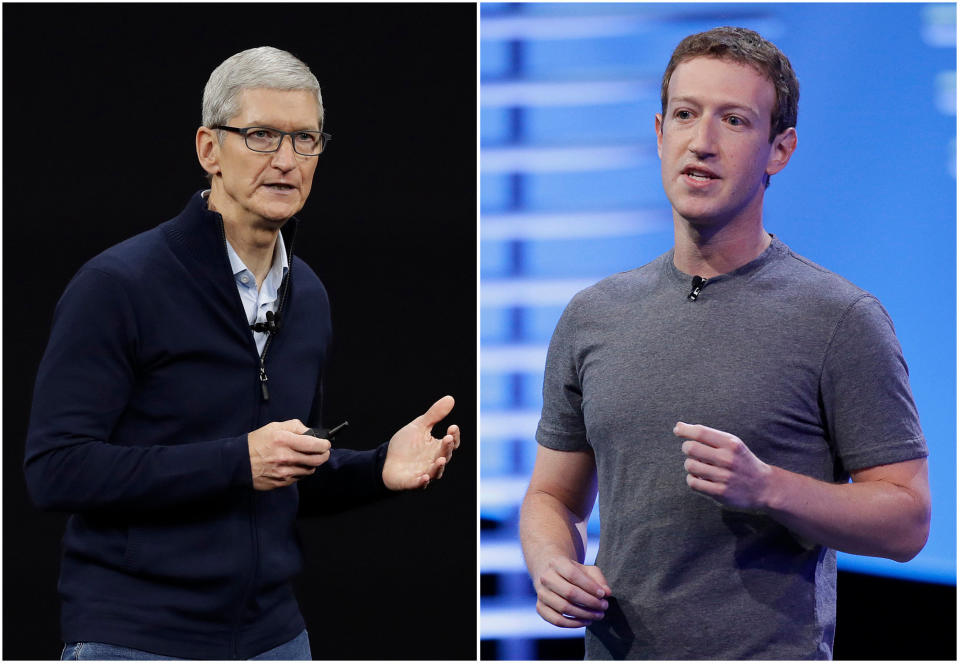Apple's war with Facebook has gone nuclear
Who doesn't love a good beef? Rocky versus Drago, Jay-Z versus Nas, Reese's Pieces versus my waistline. But the hottest heavyweight dustup has to be the battle between Apple (AAPL) and Facebook (FB).
That's right, the iPhone maker and the largest social media network have a distaste for each other that shows no sign of improving. The latest spat between two of the world's most prominent tech companies follows revelations that Facebook was paying users as young as 13 to use an app called Facebook Research that gave the company an inside look at users' phones, right down to the network traffic. In other words, Facebook was able to get a look at virtually everything these users were doing.
It's important to note that Facebook Research was labeled as a Facebook app during installation, and that users signed up for it, with younger users requiring parental consent. Still, Apple wasn't happy with the situation, and quickly pulled the plug on the app, rendering it useless.
But where does this animosity come from? It’s a little complicated.
Apple is separating itself from the tech privacy conversation
Apple has been positioning itself as the guardian of user privacy for some time now. The company's stance became a matter of national interest in the aftermath of the 2015 San Bernardino mass shooting. During its investigation, the FBI requested that Apple help break into an iPhone owned by one of the two shooters.
Apple refused to cooperate with the government, pointing out that by creating a backdoor to crack one iPhone, the company would make nearly every other iPhone on the planet vulnerable to hacking. The FBI was eventually able to crack the iPhone's security on its own, though Apple has since further fortified its devices and operating system against hacking.
The iPhone maker regularly touts that its devices are capable of performing many important operations without having to send your information back and forth to an Apple-owned server. And in recent press conferences, the company has made sure to indicate that privacy is a major priority.
Apple CEO Tim Cook also hit Facebook and Google for the way they collect user data during a speech in 2015 in which he railed against the use of consumer data.
TechCrunch, which was in attendance during the speech, quoted Cook as saying, “We believe the customer should be in control of their own information. You might like these so-called free services, but we don’t think they’re worth having your email, your search history and now even your family photos data mined and sold off for god knows what advertising purpose."
Last year, when Cook was asked in an interview with CNBC how he would react if he found himself in Facebook CEO Mark Zuckerberg's shoes following the Cambridge Analytica scandal, Cook said he simply wouldn't be in that situation. Cook then went on to state that he believes privacy is a human right that Facebook is depriving people of.

That kicked off a tit-for-tat during in which Zuckerberg hit back at Cook in an interview with Vox calling his statements glib and not aligned with the truth.
Apple then announced that it would begin blocking Facebook and other social media trackers built into third-party websites for anyone using the Safari browser.
Which brings us to the latest battle between the tech giants. Apple has suspended Facebook's ability to use apps via the iPhone maker's enterprise development program. That's because when Facebook pushed out its user tracking app, it did so via the development program since such an app wouldn't be allowed in Apple's traditional App Store.
But Facebook also wasn't supposed to push apps to consumers via the enterprise program, which was designed specifically for corporations to be able to push apps to their own employees. As a result, Apple cut off the app and the enterprise development program, leaving Facebook's employees in the lurch as they were unable to use genuine internal apps.
It was later discovered that Google was offering a similar app in a similar manner that broke Apple's rules, which the search giant agreed to take down.
It's also worth noting that Google (GOOG, GOOGL) and Amazon (AMZN) aren't immune from Apple's dislike of using consumers’ data for corporate gain. At CES 2019 in Las Vegas, Apple put up a massive billboard on a building saying that your what happens on your iPhone stays on your iPhone. The billboard just happened to overlook Google's enormous tent set up in the parking lot of the Las Vegas Convention Center.
Apple's fight over user privacy is unlikely to end any time soon. And with Facebook pulling in record profit during its recent earnings report, neither is the social network's desire for user data.
This Silicon Valley fight is just heating up.
More from Dan:
Email Daniel Howley at [email protected]; follow him on Twitter at @DanielHowley. Follow Yahoo Finance on Facebook, Twitter, Instagram, and LinkedIn.www.webdesignerhoster.com/
